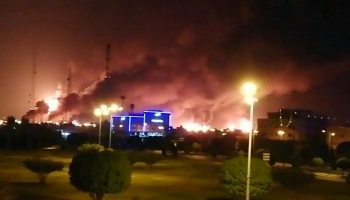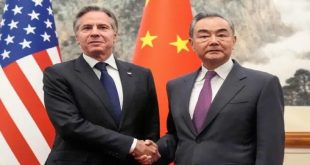16 September, 2019
RIYADH/ WASHINGTON: Fears over an outbreak of fighting between Iranian and American forces in the Gulf were revived on Sunday after the US accused Tehran of carrying out devastating drone strikes on the world’s biggest oil-producing facilities in Saudi Arabia.
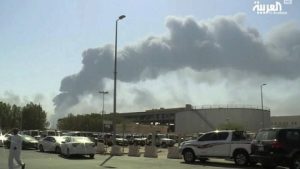 The US allegations over the pre-dawn attack on Abqaiq and Khurais in Saudi Arabia’s Eastern Province were meant to justify “actions” against Iran, foreign ministry spokesman Abbas Mousavi said.
The US allegations over the pre-dawn attack on Abqaiq and Khurais in Saudi Arabia’s Eastern Province were meant to justify “actions” against Iran, foreign ministry spokesman Abbas Mousavi said.
“Such remarks … are more like plotting by intelligence and secret organisations to damage the reputation of a country and create a framework for future actions,” said Mousavi.
While international markets remained closed on Sunday, the attacks could shock global energy prices after abruptly halting production of 5.7 million barrels per day – or about six percent of the world’s oil supply.
Tehran denied allegations it was behind the attacks, which were claimed by Yemen’s Iran-aligned Houthi rebel group.
US Secretary of State Mike Pompeo blamed Iran for the drone strikes and said there’s “no evidence the attacks came from Yemen”.
Pompeo said: “Iran has now launched an unprecedented attack on the world’s energy supply.”
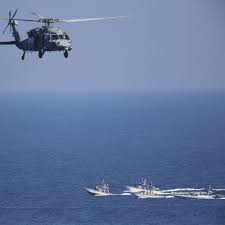 Senior US officials cited intelligence assessments, including satellite imagery, on Sunday to support their case that Iran was responsible. The images allegedly show impacts consistent with the attack coming from the direction of Iran, rather than from Yemen, they told The Associated Press on condition of anonymity.
Senior US officials cited intelligence assessments, including satellite imagery, on Sunday to support their case that Iran was responsible. The images allegedly show impacts consistent with the attack coming from the direction of Iran, rather than from Yemen, they told The Associated Press on condition of anonymity.
Additional devices that apparently didn’t reach their targets have been recovered and were being analyzed by Saudi and American intelligence agencies, the officials said.
‘A powder keg’
Iran’s elite Revolutionary Guard force said on Sunday it was prepared for a “full-scale war”.
In a not-so-subtle threat, the commander of the Islamic Revolutionary Guard Corps’ aerospace arm noted Iran’s missiles could hit US bases and ships within a range of 2,000km (1,240 miles).
“Because of the tension and sensitive situation, our region is like a powder keg,” Brigadier-General Amir Ali Hajizadeh said.
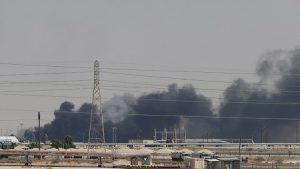
“Neither us nor the Americans want a war. When these contacts come too close, when forces come into contact with one another, it is possible a conflict happens because of a misunderstanding,” said Hajizadeh.
“Of course some forces facing each other in the field could do something by which a war could start. We have always prepared ourselves for a full-fledged war.”
American Senator Lindsey Graham, a Republican close to US President Donald Trump, urged retaliatory strikes targeting Iran.
“Iran will not stop their misbehavior until the consequences become more real, like attacking their refineries, which will break the regime’s back,” Graham wrote on Twitter.
Hajizadeh said Iranian forces were ready for a counter-attack if the United States responded militarily for the oil facility strike, naming the Al-Udeid Air Base in Qatar and Al-Dhafra Air Base near Abu Dhabi in the United Arab Emirates as immediate targets, as well as navy ships in the Gulf and the Arabian Sea.
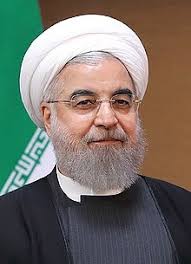 Actions on any side could break into the open a twilight war that’s been raging just below the surface of the wider Gulf over the last few months. Already there have been mysterious attacks on oil tankers that the US blamed on Iran, while Tehran shot down a US military surveillance drone – which nearly sparked a deadly retaliatory strike.
Actions on any side could break into the open a twilight war that’s been raging just below the surface of the wider Gulf over the last few months. Already there have been mysterious attacks on oil tankers that the US blamed on Iran, while Tehran shot down a US military surveillance drone – which nearly sparked a deadly retaliatory strike.
“There are hawks in Iran and America and in the region who want military conflicts,” said a senior Iranian government official, who asked not to be named because of the sensitivity of the matter.
“Such attacks will make a military confrontation inevitable and that is what hardliners in Iran and elsewhere wants. Such confrontation will harm not only Iran but all the countries in the Persian Gulf.”
‘America’s aggression’
Tehran and Washington have been at loggerheads since May last year when Trump pulled out of a 2015 multilateral deal that promised Iran relief from sanctions in return for curbs on its nuclear programme.
 Since its withdrawal from the nuclear accord, the United States has slapped crippling sanctions on Iran as part of a campaign of “maximum pressure”.
Since its withdrawal from the nuclear accord, the United States has slapped crippling sanctions on Iran as part of a campaign of “maximum pressure”.
The Islamic Republic responded by reducing its nuclear commitments and threatened to block the Strait of Hormuz in the Gulf, through which an estimated 20 percent of the world’s oil passes.
On Sunday, Iran’s President Hassan Rouhani called for a regional summit to address the attacks on Saudi Arabia, and accused Washington of diverting blame for the war in Yemen, where US ally Saudi Arabia leads a military coalition that has regularly carried out air strikes.
“Innocents die every day in Yemen… Americans – instead of blaming themselves and confessing that their presence in the region is creating problems – blame the region’s countries or Yemen’s people,” Rouhani said.
 “If we want there to be real security in the region, the solution is that America’s aggression cease. We believe the region’s issues can be solved through talks in Yemen, Yemeni-Yemeni negotiations – they must decide for themselves. The bombardment of Yemeni people must stop,” Rouhani said.
“If we want there to be real security in the region, the solution is that America’s aggression cease. We believe the region’s issues can be solved through talks in Yemen, Yemeni-Yemeni negotiations – they must decide for themselves. The bombardment of Yemeni people must stop,” Rouhani said.
Saudi Arabia and Iran back opposing factions across the Middle East, from Yemen and Syria to Lebanon and Iraq.
Saudi Arabia and the United Arab Emirates lead a military coalition to back Yemen’s internationally recognized government against the Houthis. The war in Yemen has been described by the UN as the world’s worst humanitarian disaster. (Int’l News Desk)
 Pressmediaofindia
Pressmediaofindia
